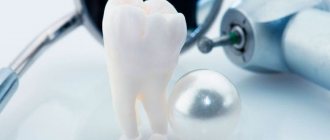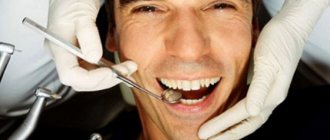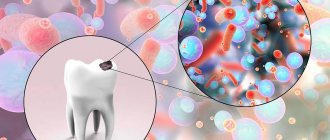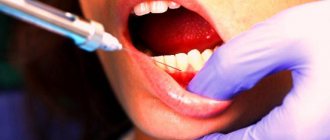Consultation with a doctor A pregnant woman is bombarded with myths from all sides about what can and cannot be done during this period. These superstitions even affect dental procedures. Pregnant women, listening to outside advice, refuse pain relief while undergoing gum treatment and endure pain, or try to avoid visiting the dentist altogether. But often such myths are completely inconsistent with modern reality. The article will help you figure out whether it is possible to treat teeth during pregnancy, remove them, take x-rays, give painkillers, or perform prosthetics.
Is it possible to treat teeth during pregnancy?
Most dentists will answer that teeth can not only be treated during pregnancy, but should also be treated if such a need arises. After all, caries, gum inflammation and other problems cause not only discomfort, but can also provoke pregnancy complications.
The period of bearing a baby is divided into three trimesters. Let's figure out when you can treat teeth during pregnancy, what period is the safest for such manipulations.
In the first trimester (weeks 1-12), the formation of the baby’s organs occurs, while the placenta, the main barrier, is not yet fully formed. This period is considered the most vulnerable, since any adverse external influence can lead to malformations and premature termination of pregnancy. In the first trimester, if necessary, simple treatment is usually carried out; more complex procedures are postponed to the second trimester, but depending on the situation, exceptions are possible.
The second trimester (13-25 weeks) is considered the most favorable for dental treatment during pregnancy. During this period, toxicosis no longer bothers the expectant mother and it will not be difficult for her to remain in one position for a long time.
In the third trimester (26-40 weeks), treatment is mainly carried out for emergency reasons. This is due to the following features of this period:
- a woman should not remain in a supine position for a long time due to compression of the inferior vena cava and aorta, so all manipulations are performed in a short time, or on the right side;
- the risk of premature birth increases.
It is important to understand that if a tooth hurts during pregnancy, you should not put off visiting a doctor. Pain provokes complex biochemical processes in the body, causing enormous stress that can harm mother and baby. Regardless of the trimester, the doctor will provide assistance that will be as gentle and safe as possible.
Content:
- Is it possible to treat pulpitis in pregnant women?
- Features of the fight against pulpitis during pregnancy
- How to avoid pulpitis during pregnancy
- Risks to the fetus if pulpitis is not treated
Pulpitis is a disease in which the internal tissues of the tooth - the pulp - become inflamed.
It leads to severe pain symptoms. Toothache becomes especially severe at night. As the body tries to fight off the infection, your body temperature may rise. If pulpitis occurs in a pregnant woman, you should not hesitate to seek qualified dental care. The doctor can help the patient in an “interesting situation” without harming the health of the fetus. Under no circumstances should a woman tolerate the symptoms of the disease. Gradually they may disappear, but this does not mean that the inflammation has subsided. Simply, pulpitis will turn into a chronic form, which is very insidious.
Do teeth deteriorate during pregnancy?
Hormonal and physiological changes that occur during pregnancy can aggravate the course of some dental diseases. For this reason, it is recommended to carry out a complete sanitation of the oral cavity at the planning stage. If your teeth were healthy before pregnancy, then after, if you follow all the recommendations (proper hygiene, consuming enough microelements), they will remain the same. Pregnancy will not affect their condition in any way.
The main cause of caries and gum inflammation is dental plaque. Therefore, the risk of their development directly depends on the quality of personal and professional oral hygiene, which should not be neglected while bearing a child.
It is not uncommon for a wisdom tooth to make itself felt during pregnancy. The gums above it begin to ache, making it difficult to eat. It is also important to think about this at the planning stage - visit the dentist, if necessary, excision of the mucous membrane over the wisdom teeth, or it may be necessary to remove the wisdom tooth.
Incorrectly performed treatment
Poor quality materials and violation of treatment technology also cause pain. Reasons for such complications include:
- the channels are not completely cleaned;
- the nerve was partially removed;
- cavities remain under the filling material, leading to tissue destruction and the development of inflammatory processes;
- During filling, the material is moved beyond the apex of the root canal;
- The doctor did not notice any branches or lateral additional channels during treatment.
Is it possible to do dental x-rays?
The most common misconception is that dental x-rays are prohibited during pregnancy. X-rays can indeed have a negative effect on the child, therefore such studies of the lungs and other organs are contraindicated during this period. But with dental x-rays, the risks are minimal, since:
- the emitted waves are so weak that they do not affect the baby;
- the rays are directed exclusively to the area under study;
- The chest and stomach are covered with a protective lead apron.
Under such conditions, the penetration of radiation through the tissues of the mother to the child is excluded.
Some clinics use dental microscopes for diagnostics instead of X-rays, the contraindications to their use are minimal.
Filling canals with hot gutta-percha
Dentists and manufacturers of dental equipment are constantly improving technologies for passing through canals, their disinfection and filling.
In the NORD DENTAL clinic, for filling complex canals, the method of vertical condensation (compaction) of hot gutta-percha is used using equipment from the German company VDW GmbH.
Today this is the most effective technology for “sealed” channels of complex shapes.
Come to the NORD DENTAL clinic for quality dental treatment.
Is it possible to give painkillers to pregnant women?
Dental anesthesia during pregnancy is not contraindicated; on the contrary, it helps reduce pain and stress, which negatively affect the condition of mother and baby.
Modern anesthetics based on articaine are absolutely safe during pregnancy, because:
- The drug is injected exclusively into the area of intended intervention, and its entire volume is distributed there.
- The drug does not enter the bloodstream and deep tissues, so its penetration through the placenta to the baby is impossible.
The newest drugs for pain relief also reduce the content of vasoconstrictor components. The child will not experience any discomfort or lack of nutrients during the mother’s treatment.
Ways to relieve pain and inflammation
The safest and most effective way to reduce the pain and swelling that occurs after tooth extraction is to apply a cold compress to the cheek. If this measure does not bring the desired effect, then it is recommended to take analgesics: analgin, ibuprofen, ketanol, diclofenac, etc. The dosage regimen of the drugs is indicated in the instructions for them.
After complex extractions, patients are additionally prescribed antibiotics, since in these cases there is a high probability of developing purulent and inflammatory processes.
Important information! It is strictly forbidden to rinse your mouth for 7 days after removal of the chewing organ. This manipulation leads to the washing out of the blood clot from the socket.
Removal and prosthetics of teeth
Tooth extraction during pregnancy is not prohibited, but the operation is performed only in cases of urgent need. Each case is considered by a doctor individually. To numb a tooth after extraction, only safe medications are used during pregnancy.
Removal of nerves in a tooth during pregnancy is carried out in case of deep caries, when the infection has already penetrated the root canal and affected the pulp; otherwise, they try to cure the nerve using conservative methods.
Prosthetics are possible, but also with limitations. It is possible to install crowns, but it is better to postpone the implantation of an artificial implant. This is due to the fact that:
- the implantation process is quite complicated and requires a lot of effort;
- in the postoperative period it is necessary to take strong painkillers and antibiotics, which are not safe for the child;
- During the period of bearing a child, there is a high risk of rejection of foreign material.
It is not only possible, but also necessary to treat teeth while carrying a child. Timely treatment will keep the mother healthy and prevent the possibility of infection of the fetus. Modern drugs and anesthetics, developed specifically for pregnant women, not only do not have a toxic effect, but also make the treatment as painless and comfortable as possible.
Before visiting the clinic, you can consult with friends who have undergone similar procedures, find out how teeth were treated during pregnancy, and which dentist.
The experience of other people will help you cope with fear. When visiting a doctor, it is important to notify about your condition. The doctor's consultation
WHAT ABOUT ARSENIC
Arsenic is an extremely dangerous toxic substance that is completely unacceptable during pregnancy. In Soviet times, the use of poison was the only method of removing a nerve - a paste containing a small amount of arsenic was placed into the tooth cavity and covered with a temporary filling. With this “stuffing” it was possible to walk for up to two days until the nerve died. After this, a second visit to the dentist was required, during which the no longer living nerve was removed. Fortunately, in the modern world this method is practically not used, and the entire procedure is performed during one appointment and takes approximately 30-40 minutes.
After removal, the canals are filled, and the choice of materials should take into account your position. Dentists often recommend placing a temporary filling and replacing it with a permanent one after the birth of the child.
Important! If the toothache is unbearable, you will have to take an analgesic. During pregnancy, only paracetamol-based drugs are considered relatively safe, but they also have contraindications, so you should try to take the minimum permissible dose.
Can anesthesia be used during pregnancy?
For pain relief, it is recommended to use hypoallergenic local preparations. They are well tolerated, do not cross the placenta, and do not harm the baby. Anesthetics containing large amounts of adrenaline should not be used. It can provoke muscle spasms and increase the tone of the uterus, which increases the likelihood of miscarriage. Such drugs are prohibited for pregnant women. The dentist must be specifically warned that they should not be used.
Simple treatment for incipient caries can be performed without anesthesia if the woman tolerates it well. It does not affect the nerves and does not cause discomfort. If complex intervention or surgical procedures are needed, they are carried out only for urgent indications (acute inflammation, dental injuries, etc.). In other cases, treatment is delayed until the postpartum period.
Reasons why a tooth without a nerve hurts
- Re-infection
- not all affected tissues were removed, the source of infection remained, and the inflammation began to spread again. This can happen if endodontic treatment is performed without a dental microscope or if the dental canals have a very complex structure, which does not allow for high-quality cleaning and disinfection. - Poor-quality filling
- when filling the canal, there are voids left in the canal, areas not filled with material, in which pathogenic microorganisms begin to multiply, which leads to inflammation, the development of periodontitis, the formation of cysts, granulomas. - The exit of the filling masses
beyond the root apex - the filling material, having exited through the apical foramen, hardens in the periodontal tissues, compresses the nerve endings, and disrupts blood circulation. Inflammation develops in the periodontium, accompanied by severe pain. - Perforation of the canal walls
– in the area of perforation, the dental tissue becomes infected and inflamed; during filling, the composite may escape beyond the boundaries of the canal. - Incomplete depulpation - due to the complex structure of the canals, the doctor was unable to remove one of the nerve endings. The use of a dental microscope with good optics significantly improves access to the prepared cavity and facilitates the detection of the canal orifices and all nerve branches.
- A fragment of an instrument
in the canal - during expansion, cleaning, filling, a piece of the instrument could break off and remain in the dental canal. The presence of a foreign object contributes to the formation of voids, where conditions are created for the proliferation of bacteria and the development of inflammation. - An allergy
to filling materials or a drug is accompanied by pain, swelling, and discomfort in the area of the dental unit. - A filling that is too high
– the opposite tooth (antagonist) puts excessive pressure on the filling, which leads to the appearance of pain. - Damage to the adjacent unit
- pain spreads (radiates) along the gum from the adjacent tooth.









